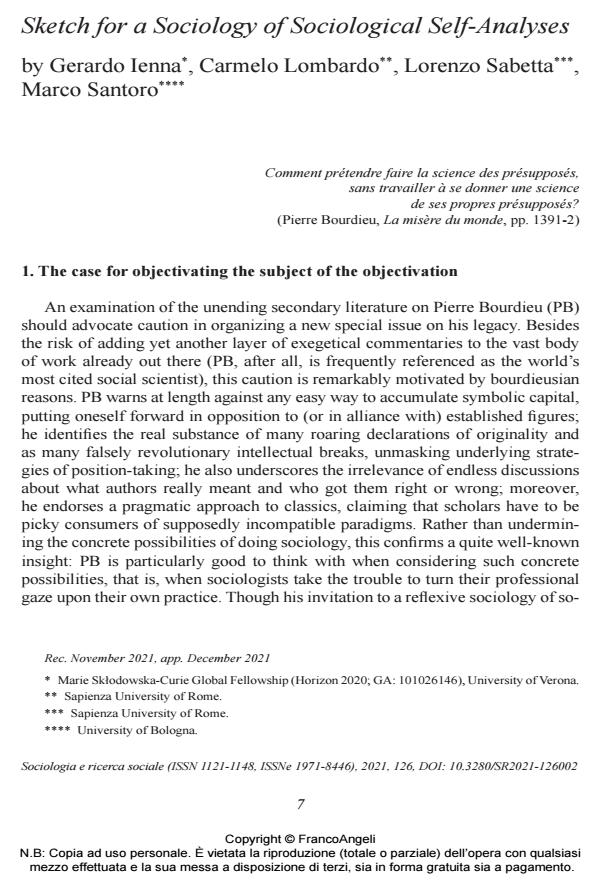Sketch for a Sociology of Sociological Self-Analyses
Titolo Rivista SOCIOLOGIA E RICERCA SOCIALE
Autori/Curatori Gerardo Ienna, Carmelo Lombardo, Lorenzo Sabetta, Marco Santoro
Anno di pubblicazione 2022 Fascicolo 2021/126
Lingua Inglese Numero pagine 19 P. 7-25 Dimensione file 253 KB
DOI 10.3280/SR2021-126002
Il DOI è il codice a barre della proprietà intellettuale: per saperne di più
clicca qui
Qui sotto puoi vedere in anteprima la prima pagina di questo articolo.
Se questo articolo ti interessa, lo puoi acquistare (e scaricare in formato pdf) seguendo le facili indicazioni per acquistare il download credit. Acquista Download Credits per scaricare questo Articolo in formato PDF

FrancoAngeli è membro della Publishers International Linking Association, Inc (PILA)associazione indipendente e non profit per facilitare (attraverso i servizi tecnologici implementati da CrossRef.org) l’accesso degli studiosi ai contenuti digitali nelle pubblicazioni professionali e scientifiche
This essay analyzes one of the major expressions of the sociological critique of sociological reasoning, the objectivation of the subject of objectivation, who should analyze the sociohistorical conditions of possibility of the very act of objectivation. Though Bourdieu’s invitation to a reflexive sociology of sociology has not been widely accepted and put into practice, the authors argue that its actual application actually brings about consistent payoff: this special issue represents but one installment. Reclaiming a place for socio-analysis, this paper highlights how this activity can produce a cognitive difference in the making of sociological research, insofar as its genesis and development are defined by the sharing of a specific thought style, existing within and because of an intersubjective framework.
- Handbook for the Historiography of Science Gerardo Ienna, pp.1 (ISBN:978-3-030-99498-3)
- Handbook for the Historiography of Science Gerardo Ienna, pp.1 (ISBN:978-3-030-99498-3)
- Handbook for the Historiography of Science Gerardo Ienna, pp.145 (ISBN:978-3-031-27509-8)
Gerardo Ienna, Carmelo Lombardo, Lorenzo Sabetta, Marco Santoro, Sketch for a Sociology of Sociological Self-Analyses in "SOCIOLOGIA E RICERCA SOCIALE " 126/2021, pp 7-25, DOI: 10.3280/SR2021-126002